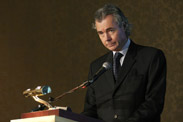MISC thinks global
"The challenge for Canadian foreign policy is to balance finite resources with infinite requests," according to Pierre Pettigrew, the minister of foreign affairs. This perspective on Canada's place on the international stage was the one he presented in his keynote address to the McGill Institute for the Study of Canada's (MISC) 10th annual conference, "Canada in the World."

Minister of Foreign Affairs Pierre Pettigrew
Owen Egan
The two-and-a-half-day event drew scholars and representatives from organizations as diverse as Human Rights Watch, Engineers Without Borders and the Geneva Centre for Security Policy. The country's role in terms of resources and expertise, our relationship with other nations and our response to global questions sparked numerous discussions and debates.
The conference also brought together a number of politicians. In fact, Pettigrew was the first of three ministers to speak on February 18, the last day of the conference. Both Minister of National Defence William Graham and Minister of International Cooperation Aileen Carroll also addressed the 400 registrants later that same day. Pettigrew joked about the fortitude of the conference delegates: "Three federal ministers in one day is more than I could stomach."
Judging by the crowd gathered in the Omni Hotel hall to hear Pettigrew at nine in the morning, the opinion of Canada's federal ministers was exactly what the people filling the seats and standing by the doors wanted. Each year the MISC's conferences have brought together key leaders to address themes that have ranged from Canada's media to the place of youth in Canadian society and the role of cities in shaping the nation. This year's theme considered Canada's role geographically, both in terms of natural resources and in proximity to our increasingly assertive southern neighbour. However, Canada's role on the international stage was considered from every angle.
After an early morning introduction by the MISC's director, Antonia Maioni, Pettigrew opened his half-hour speech by stressing the appropriateness of this year's conference theme: "Seven years ago, I wrote in my book, The New Politics of Confidence, that 2005 would be a year to consider Canada's place on an international scale."
Pettigrew was clearly proud of Canada's global image. He said that, time and again, in trips to regions across the globe, those he met shared the same impression of our country. "'You accompany us in our development, you don't dictate it,'" he said, quoting someone he had met in West Africa, where a large number of Quebec-based NGOs are active.
This Canadian specificity is something that he stressed should be built upon on the global scale. "Canada is different; we have developed a personality that is recognized by others," said Pettigrew. He added that our international profile relies on a reputation for "foreign policy that is based on principles of fairness in international law, and not on national interests."
Although Pettigrew was unwilling to discuss the recent parliamentary kerfuffle over splitting his department's trade and foreign affairs mandates (a government recommendation defeated in the House of Commons), he acknowledged that Canadian international policy has been under review for the last year. He said that that is to be expected. "Every time anyone says that we shouldn't be active in one place, they also suggest another." He added that Canadians represent many communities in the world and the country's citizens would like to see Canada take an active role in other regions.
That, too, represents a specifically Canadian point of view - "our collective sense of global responsibility" - which Pettigrew said was expressed in the $200 million in donations made by individual Canadians for tsunami disaster relief.
However, he warned that Canada's relatively privileged position on the global stage can lead to a tendency to expect more from our government than can be efficiently accomplished. Spreading Canada's resources too thin can easily backfire, he said.
Pettigrew said that Canadian foreign policy must focus on Canada's strengths and build on them. He broadly defined three areas that could become priorities for review:
1) Strengthening Canada's foreign affairs profile and diplomatic presence to be better able to respond to international crises;
2) Determining the role Canada can take in situations where democracy and security are threatened. He cited the Middle East and Haiti as two such examples; and
3) Canada's responsibility to protect on a global level, ranging from managing global infectious disease to environmental threats like global warming.
Canada's role in the situation in Haiti provoked the most controversial reaction. An hour before Pettigrew's talk, a dozen protestors were escorted out of the hotel by security when they attempted to hand out leaflets decrying what they described as Canadian participation in police-sanctioned violence in Haiti.
After his address, several journalists attempted to question him more closely about Canada's involvement in Haiti. Pettigrew denied the allegations of violence, and reiterated that he is proud of Canada's role there in training police officers.
